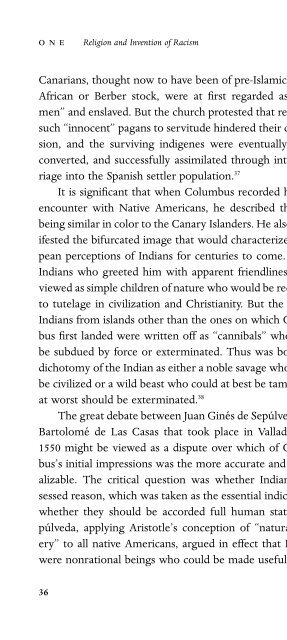Racism - A Short History - George M Fredrickson.pdf - WNLibrary
Racism - A Short History - George M Fredrickson.pdf - WNLibrary
Racism - A Short History - George M Fredrickson.pdf - WNLibrary
You also want an ePaper? Increase the reach of your titles
YUMPU automatically turns print PDFs into web optimized ePapers that Google loves.
TWO The Rise of Modern <strong>Racism</strong>(s)<br />
awakened the demons of racism to a greater extent than<br />
the polemical defense of slavery had done. The rhetoric of<br />
the latter had been leavened by a good deal of condescending<br />
paternalism that had stressed the inherently “childlike”<br />
nature of African Americans. Postwar racism, especially in<br />
some of its popular manifestations, portrayed black males<br />
as beasts lusting after white women, some of whom needed<br />
to be hanged or burned alive by lynch mobs to keep the<br />
rest properly cowed and respectful of white authority. 56<br />
These two flawed or limited late-nineteenth-century<br />
emancipations—of the Jews in Germany and of blacks in<br />
the United States—may seem very different in both context<br />
and character. But there are some intriguing analogues that<br />
make a close comparison worthwhile, even if, in the end,<br />
the differences are more significant than the similarities. In<br />
both cases, first of all, federalism served as an obstacle to<br />
equal citizenship. The American Civil War may have determined<br />
that a state cannot be sovereign, but resolution of<br />
this constitutional issue did not prevent the states from having<br />
rights that could, given a Supreme Court respectful of<br />
their prerogatives, make it extremely difficult to protect<br />
blacks from discrimination. As we have already seen, German<br />
citizenship in the Reich after 1871 did not prevent discrimination<br />
on the state level under the cover of established<br />
religion. Second, in both the United States and Germany,<br />
rapid industrialization and economic growth gave rise to<br />
situations where members of the majority were in competition<br />
or at least potential competition with members of the<br />
outgroup for jobs or other economic opportunities—something<br />
that would have been inconceivable in the era of the<br />
ghetto and the slave plantation. 57<br />
82
















